


“The concept of independence has different meanings as children grow up.”
- Andrew Roff




“The concept of independence has different meanings as children grow up.”
- Andrew Roff
Ahighlight of my week is playing with the three- and four-year-olds that visit us from Likhit Daycare on Soi Lasalle each Monday. They enjoy the wonderful facilities of our Foundation Stage and the activities that are organised for them by some of our Year 12 students engaging in the Service-Learning element of their Senior Studies programme. Over the year I have enjoyed watching both sets of children grow in their independence. For the little ones, milestones such as learning to put their shoes on their correct feet (and keep them there!); for our Seniors, learning to engage with children from very different backgrounds, often with a language barrier and developing their confidence to lead, take responsibility for and critically reflect on activities they have run. Both are developing independent competence1
Developed independence is a significant element of the shift from pedagogical (child learning) to andragogical (adult learning) approaches, and one that is a necessary element of our Senior Studies academic programme. Term 3 of our academic year includes two very clear examples demonstrating this shift and the support we provide our students to develop their independence.
complex interpay of knowledge, skills, beliefs, attitudes and values.
The Extended Essay (for the IB DiIploma and from August the Reflective Project for the IB Career-related Programme) is an opportunity for our Senior Studies students to explore a topic of interest and engage in an academic deep dive. Whilst students are taught the fundamentals of good research practice (see our Library developed Super Six): how to source, evaluate and critique appropriate research, they are also expected to demonstrate autonomy in their research, punctuated by regular consultation sessions with their appointed supervisor to ensure they stay on track. This allows students to pursue a range of stimulating investigations, which are personalised to their own interests. Our Year 12 students are now deep into the research phase of their Extended Essays, with working research questions that demonstrate the phenomenal breadth of interests of our Grad25 cohort. For example...
• To what extent did Balenciaga’s 2022 Holiday Campaign impact its brand image?
• How are the themes of conformity and individuality explored in Yevgeny Zamyatin’s ‘We’?
• What are the environmental implications of veterinary waste disposal practices, and how do they affect soil

and water quality in agricultural areas?
• How will the development of SpaceX’s reusable rocket engine modules affect the development of the space industry as a whole?
Our Year 12 and Year 13 students (as well as our Year 10 and 11 students) take examinations during Term 3. For our Year 12 students this is their first experience of IB style examinations, and is designed very much as a formative experience, with feedback and feedforward being its primary aim. For our Year 13 students, the experience is a very different one. Their exams are external and summative - they do not receive feedback other than their final grades.
For both sets of students, implicit in a successful examination session is perfect preparation (preventing poor performance). This means revision.
Ample research has shown that cramming for exams is ineffective. Good revision is an extended process of transferring information from short-term (working memory) to
long-term memory and then back again as is required. Students employ techniques such as scaffolding, spaced practice, interleaving, elaborative interrogation and dual coding to aid their retrieval practice (Weinstein, Sumeracki and Caviglioli, 2019). This allows them to take what they have learnt in lessons with teachers, as well as experiences beyond the classroom, and apply it to new and varied contexts with confidence and success - the very demonstration of independence.
We look forward with excitement and anticipation to the results of our Grad24 cohort - a reward for all their hard work, which will be issued by the International Baccalaureate Organization to them on 6th July 2024. For Year 11 (I)GCSE results will be published on 13th August 2024 (Cambridge) and 22nd August 2024 (Edexcel).
Dominique Simone Rychen and Alejandro Tiana Ferrer (2004). Developing Key Competencies in Education. UNESCO.
Weinstein, Y., Sumeracki, M. and Caviglioli, O. (2019). Understanding how we learn a visual guide. London Routledge, Taylor And Francis Group.
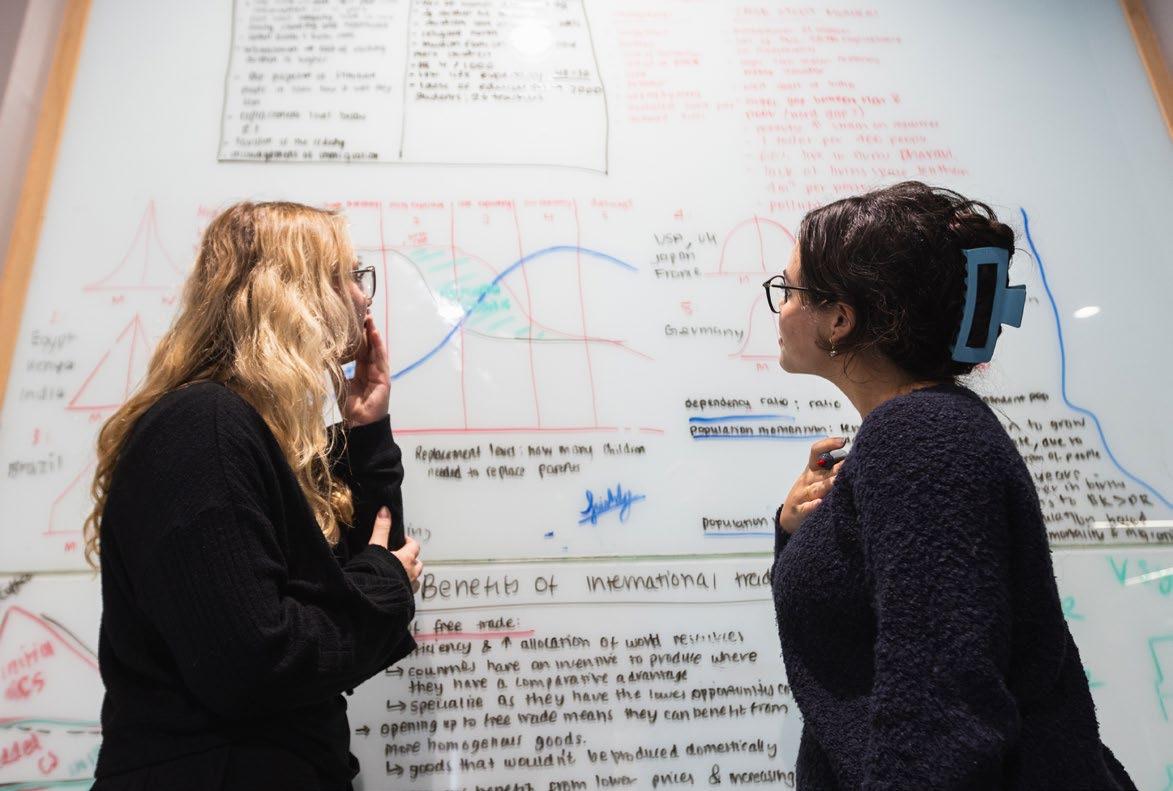
If you require documentation from the school to support visa applications or extensions over the summer break, please request this as soon as possible. To do so, kindly complete the online request form via the Parents’ Gateway: Document Request from Admissions.
Please note that we require at least 3 working days to process these requests. The final date to request certified letters or documentation for visa extensions is Friday 14th June 2024.
Kindly be aware that no requests can be processed between 1st and 31st July. The Admissions Office will be open to support new requests starting from 1st August 2024.
Admissions Team
Please share your experience of our school photo provider for this academic year (2023/24) by kindly filling out this form: https://forms.office.com/r/KLtE2FNDS1
PRIMARY - PARENT FEEDBACK FORM JUNE 2024
Please follow this link to access the survey. It will be open until next Friday.
Parent Feedback Form
Please click here to see the list of magazines which the libraries have subscribed to
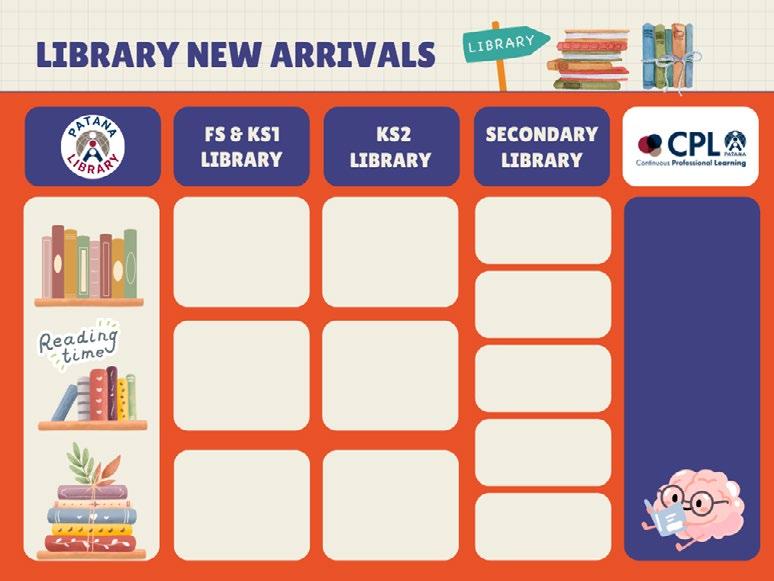
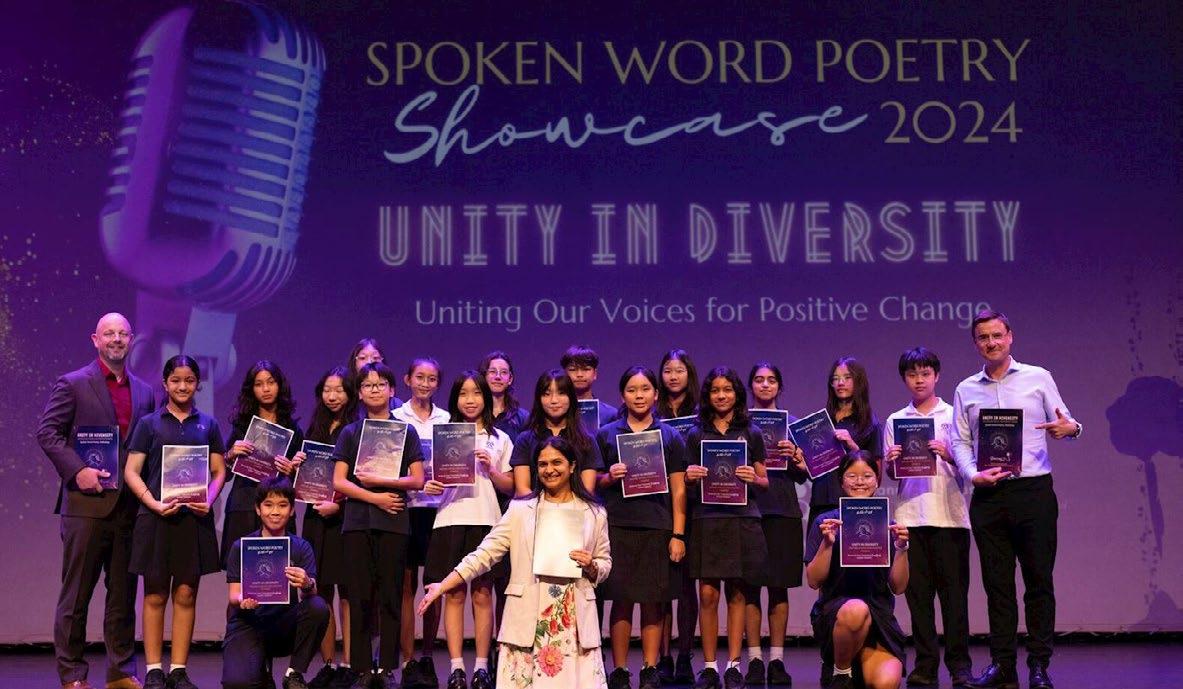
Year 7 English Extended Learners create and perform poems inspired by Diversity, Equity, Inclusivity, and Justice values (DEIJ) and Sustainable Development Goals (SDG) as part of the Spoken Word Poetry Showcase project and production.
As the spotlight falls on the stage, a question emerges from the silence: can this poem effect real change? With bated breath, each performer brings their unique perspectives, cadence, tone, rhythm, and metaphors, delivering powerful calls to action that aim to galvanise and ignite collective action. As they leave the stage, the audience is left with a reflection and realisation: yes, poetry can impact social awareness and personal growth, and they felt it deeply from the young and courageous writers.
The Spoken Word Showcase provides students with a platform to explore global issues, express their individualities confidently, and inspire others to join them in making a difference. As an English teacher and spoken word poet who facilitates the ECA, the showcase reflects my vision for using poetry as a tool for positive change, enabling
our students to explore their creative potential while understanding their rights and responsibilities in today’s globalised world. Isn’t it essential to empower students to use their voices for transformative progress at personal, local, and global levels? By integrating interdisciplinary learning through publishing and performing their work, along with critical engagement with the SDGs, students are equipped with the skills and mindset to unleash their voices for change.
Students were tasked with creating individually authored poetry collections, performing for a supportive audience, and contributing to a published poetry anthology. This year, each poem reflected a unique perspective on the theme ‘Unity in Diversity’ and served as a call to action. From fighting racism and empowering refugee voices to promoting gender equality, preserving biodiversity, and celebrating cultural diversity, these poems showcased their creativity and passion, uniting audiences and embodying responsible global citizenship. Through this project, students honed their writing, research, creativity, collaboration, and public speaking skills. But what steps did they take to perform with such bravery and conviction?
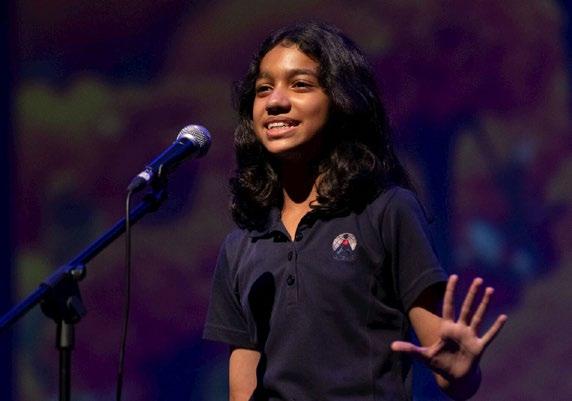
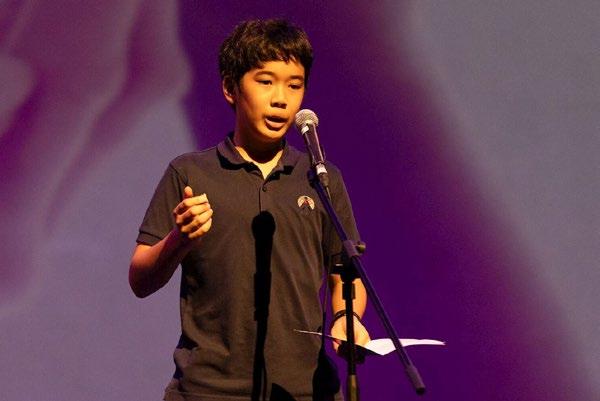

To begin, we asked: What does it mean to embrace diversity and unity in today’s world? How can poetry advocate for harmony? How do you envision a world where diversity is celebrated and differences are embraced? These questions sparked the vision for this year’s showcase theme, ‘Unity in Diversity.’ Through inquiry-based lessons, students unravelled the intricacies of the theme, connecting it to personal experiences, values, and principles crucial for unity in a diverse community.
Armed with knowledge and inspiration, students researched significant days on the DEIJ Calendar and studied how communities worldwide promote unity. From International Women’s Day to Human Rights Day, each occasion reminded them of the importance of inclusivity and equality, fuelling their passion for progress.
Ultimately, we defined ‘Unity in Diversity’ as celebrating and embracing differences while working together towards common global goals. In our diverse international school, this message resonates deeply, highlighting the pivotal role we play in championing respect and understanding amidst our individual differences.
Subsequently, students analysed various poetry forms, including shape, portrait, collage, and question-andanswer poems, to grasp how language techniques, symbols, motifs, form, and structure convey unity with clarity. They studied activist spoken word poets like Amanda Gorman, Benjamin Zephaniah and Maya Angelou. Music lyrics from humanitarian artists such as Bob Marley, Michael Jackson, and the Beatles also offered insights into effectively using language techniques to promote unity.
By exploring issues they feel passionate about, the Year 7s went on to plan and write their own poetry collections with attention to purpose, message, tone and techniques. They honed collaboration skills by providing constructive feedback to peers and showcased creativity in editing and designing their own publications, selecting cover designs, fonts, images, and layouts.
“I enjoyed planning and writing our own poetry collections because that was when we got to express what we thought ‘Unity in Diversity’ meant to us as individuals, and we could also see what ‘Unity in Diversity’ meant to others, and how they perceived it.” Ying Ying Han, 7R
Immersed in the art of spoken word, students learned and applied a variety of performance techniques, including gestures, pacing, intonation, articulation, voice projection, eye contact, and passionate delivery - each one a key to unlocking the potential of their poetic voices, enhancing their message clarity and emotional impact. Through intense, dedicated collaborative rehearsals and peer review, they refined their public speaking and presentation skills, gaining confidence in delivering powerful and engaging performances.
“I enjoyed the process of peer-reviewing our poems as it allowed us to explore a larger variety of poetic techniques from each other’s poems, giving us constructive feedback that helps us improve our work.” Ethan Choi, 7J
The project culminated in the students’ outstanding performances at the Spoken Word Showcase, where each recited a poem from their own authored collection. Their celebration of diversity, embrace of differences, and stance against injustice left us inspired and proud, fostering hope, determination, and unity for positive change among parents, teachers, and peers alike. A big thank you to everyone who joined to show their support for the students, affirming the importance of their voices.
“I developed my public speaking and further improved my planning, communication, and collaboration skills. After much hard work, we are all thrilled to present our poems to all of you.” Glenda Ho, 7B
Innovative English teaching empowers students as active participants in shaping a better tomorrow through projects like the Spoken Word Poetry Showcase. Each year, this event focuses on a different theme, encouraging students to craft messages from diverse perspectives, whilst fostering a strong sense of camaraderie throughout the process. Next year, the showcase will be part of the new English Enrichment ECAs, extending its reach to Year 7-9 students.
“I plan on ensuring more people are aware of the negative impact of pollution, not just on animals but us humans too. It’s never too late to make a change.” Khongkwan Kim, 7B
“I hope I will have the chance to do something like this again. I really enjoyed doing this project; it helped me be brave enough to stand up on stage and perform something that I have been working on for a long time and feel really passionate about.” Tian Suthiwongsunthorn, 7J
Click the link to experience the transformative voices of our youth.
Experience the captivating performances of our students as they take the stage to share their inspiring words.

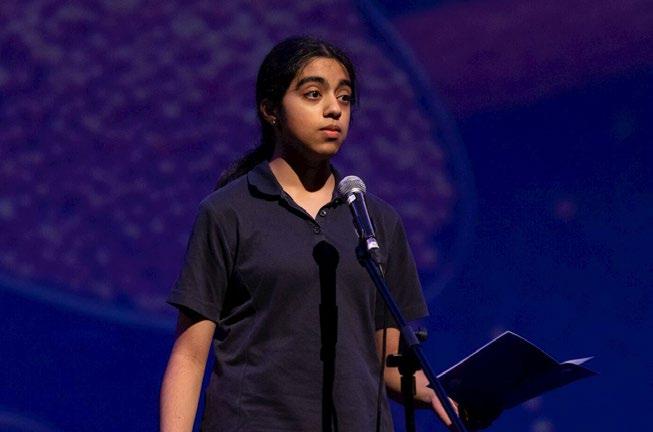
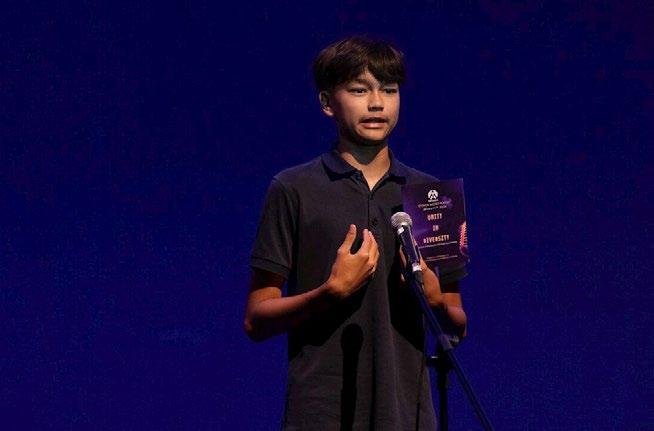

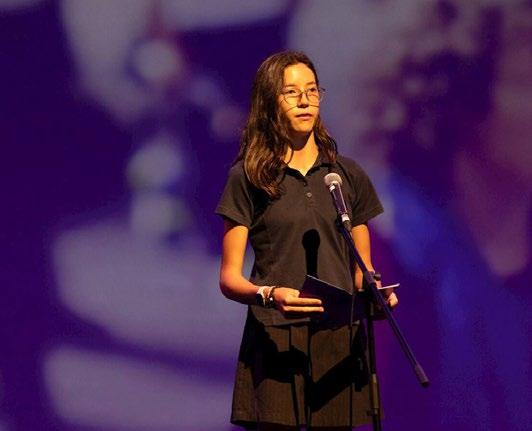
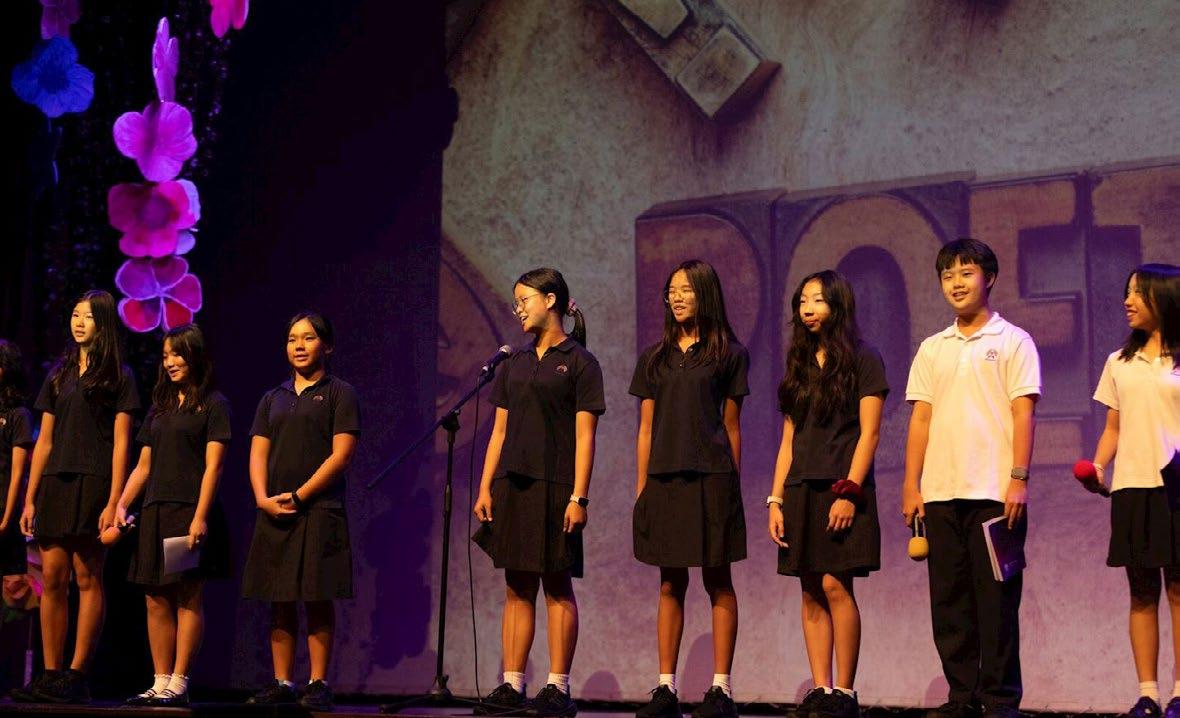
Hello human,
My name is Ocean and I’ve something to say I’m dirty with oil that won’t wash away.
My dolphins, once many, now dwindle each year
While cod, shark and tuna swim hunted in fear.
Since time began, my seas were pure blue
That’s no longer the case and it’s all coz of you.
Some people say “The ocean is mending”
But look around, they’re just pretending!
Seas of plastics and beaching whales
Sewage inflows and broken sails.
Dead white corals and black oil slicks
Overfishing and resource conflicts.
But that’s not how its supposed to be
Take a deep breath and dive into me,
Gaze at tropical fish, swimming wild and free
Seagrass swaying, feeding manatee
In cold southern waters, penguins thrive
With seals and krill, I keep them alive.
So, human,
Forget your divisions, grudges and splits,
Your endless squabbles and battles and fits,
Instead give your hearts to something of worth,
To saving the oceans on our planet Earth.
So that all marine life can forever live free, All splendid creation at home in the sea.
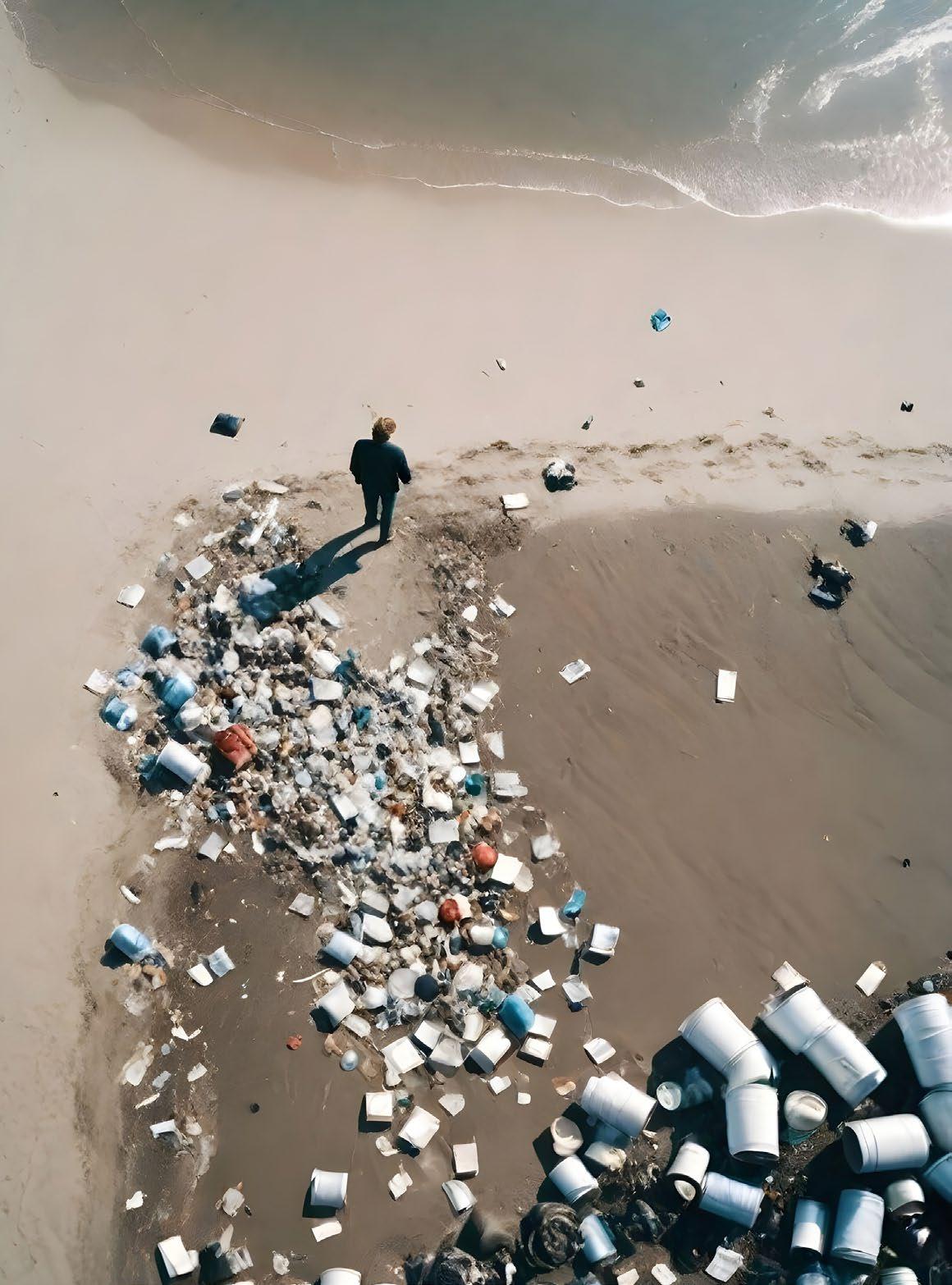
-Alice Murphy, 6S
Did you know that almost everything we eat involves water? Only about 2.5% of the Earth’s water is freshwater, with less than 1% of it readily accessible for human use from sources like rivers, lakes, and shallow groundwater. This limited availability highlights the importance of conserving and protecting our freshwater resources. From growing crops to feeding livestock, water is essential. But, not all foods use the same amount of water. Some might surprise you with their high water “footprint.” Let’s dive into the details!
1. Beef
Raising cattle and producing feed takes a whopping 15,000 litres of water per kilogram. Beef production also accounts for a large proportion of emissions.
2. Almonds
Known for their water needs, especially in dry areas. They require about 9,000 litres per kilogram.
3. Rice
Flooded fields mean rice is water-intensive, using around 2,500 litres per kilogram.
4. Pork
Pigs need water for drinking and feed, totaling about 5,000 litres per kilogram.
5. Poultry
Chicken, although less than beef or pork, still needs significant water—around 4,325 litres per kilogram for skinless, boneless chicken breast.
6. Dairy (Cheese)
Dairy cows and milk processing take about 5,000 litres per kilogram.
7. Chocolate (Cocoa Beans)
A surprising contender, cocoa beans need 17,500 litres per kilogram. Cocoa is also one of the key crops known for employing child and forced labour worldwide.
8. Palm Oil
Large plantations require about 5,000 litres per kilogram. Palm oil also has a host of other environmental challenges.
9. Soybeans
Often needing substantial irrigation, soybeans use about 2,000 litres per kilogram.
10. Sugar

Whether from sugarcane or sugar beets, it’s water-intensive at 1,500-2,000 litres per kilogram.
1. Mushrooms
Highly efficient, using typically less than 30 litres per kilogram. Mushrooms are a superfood.
2. Lentils
A great option, with a footprint of about 400-500 litres per kilogram.
3. Chickpeas
Similar to lentils, they need around 1,100 litres per kilogram. Reach for that Hummus!
4. Barley
Lower than other cereals, using 1,300-1,400 litres per kilogram.
5. Quinoa
Resilient and efficient, requiring 1,300-1,500 litres per kilogram. Quinoa is an ancient grain which has grown in popularity in recent years.
6. Oats
Need relatively low water, around 900-1,200 litres per kilogram.
7. Broccoli
Water-efficient, at about 350-400 litres per kilogram.
8. Spinach
Grows well with minimal irrigation, needing just 200250 litres per kilogram.
9. Green Beans
Thrive with moderate water, around 200-250 litres per kilogram.
10. Cabbage
Hardy and water-efficient, using 250-300 litres per kilogram.
Switching to a more plant-based diet can significantly reduce your water footprint! By choosing foods that require less water, you help conserve one of our planet’s most precious resources. It’s a simple yet impactful way to make a difference.
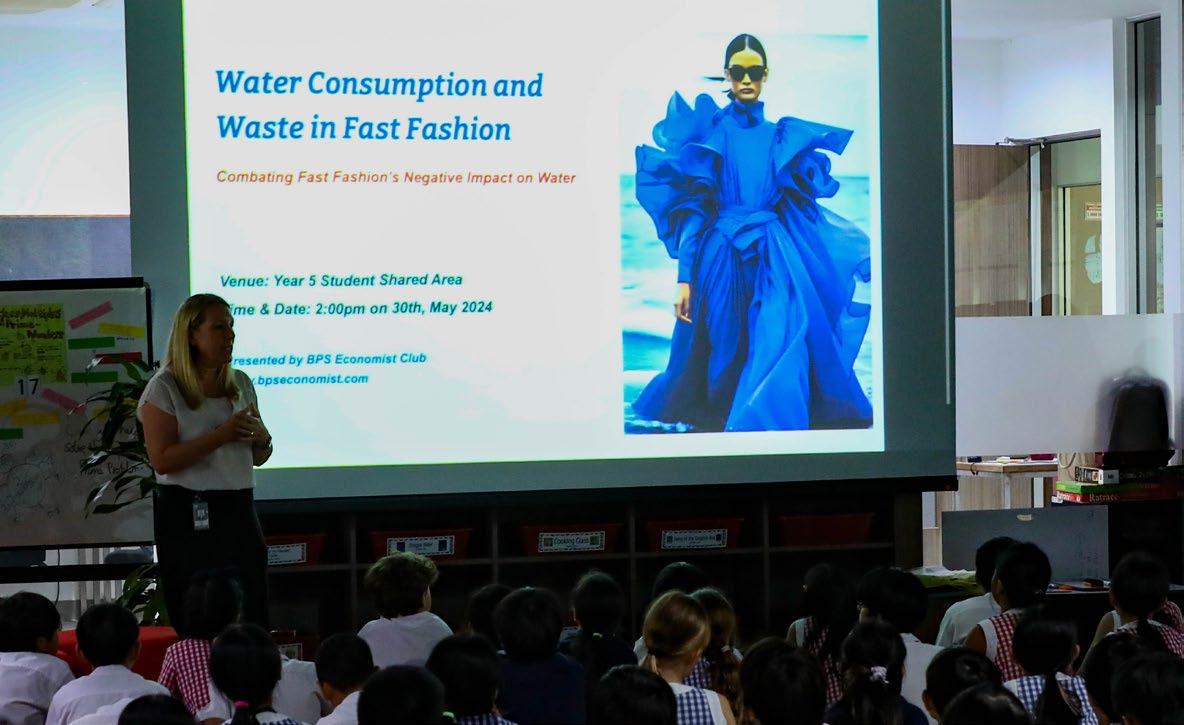
TheBPS Economist Club had the opportunity to speak with Year 5 students about the detrimental impact of purchasing from fast fashion brands and the harmful consequences the fashion industry brings about. Discussing the benefits of reusing and recycling clothing, as well as the damaging consequences of rapid fashion. Our goal was to highlight the impact of seemingly minor actions, such as purchasing new clothes, may have a significant influence on our vulnerable and diminishing world. How it is our responsibility to safeguard its enchanting and irreplaceable beauty for future generations.
Did you know that fast fashion industry is the second largest consumer of clean water globally?
After hearing from my brother (who is also in Year 5) a few nights prior to our presentation, about this year’s recent mission of raising money in their upcoming bake sale for water wells in Cambodia, due to the lack of accessibility to clean water, we realised that it is not only important to spread awareness about helping others gain access to clean water but also about how we can help preserve and reduce water waste. As not only can these young minds start now to contribute and reduce water pollution and preserving our waterbodies from a young age, but it is not late for others as well.
It was great to see the students display a genuine curiosity and eagerness to learn about these subjects. We were delighted to witness the generous donations of young individuals who have already contributed their gently used clothing to our donation boxes. Additionally, it was inspiring to witness their genuine curiosity about our club’s activities and their eagerness to learn how they can contribute and make a difference in addressing this issue of market failure.
We had the opportunity to educate them on the significant impact that these humble, secondhand garments have had on underprivileged children in the slums and rural areas of Bangkok, where access to quality clothing is scarce. And the joy they bring to the orphan children at the Mercy centre to whom we regularly meet and donate too. In addition to this, the club had the chance to demonstrate the potential of reusing clothes and up cycling fabrics into various items, rather than letting them end up in landfills or worse in the ocean. It was truly inspiring to witness the younger generation’s dedication to making a difference in the environment. Their enthusiasm for reducing their carbon footprint and taking small, yet impactful steps towards saving our planet is commendable. It’s encouraging to see them being conscious of their actions from such a young age and supporting our endeavours in the Economist club in the process.

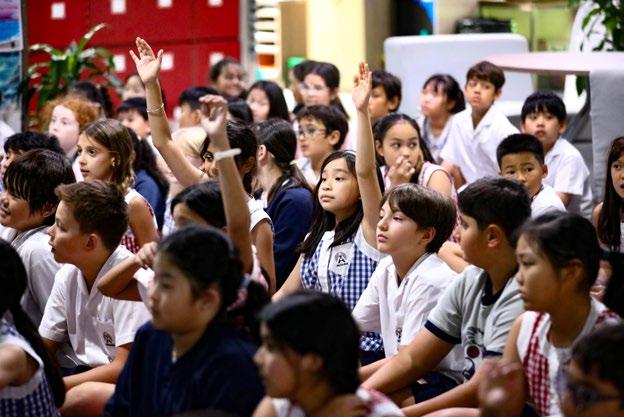
Our goal was to highlight the impact of seemingly minor actions, such as purchasing new clothes, may have a significant influence on our vulnerable and diminishing world.
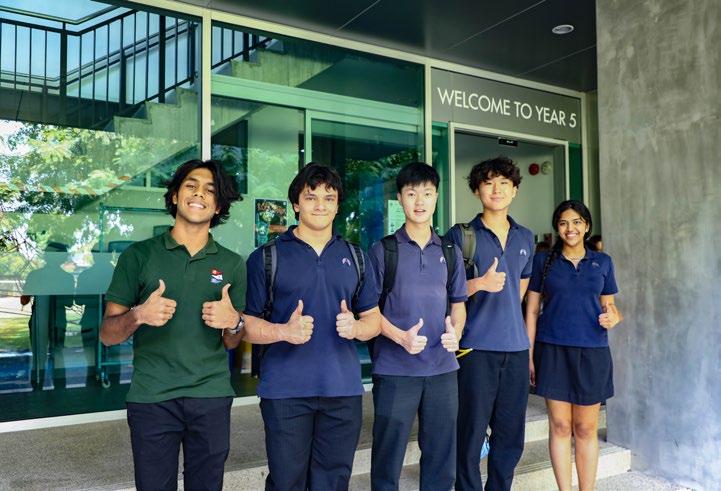

is a club that aims to raise awareness of the lack of medical and sanitary supplies in rural areas of Thailand. We raise funds through fundraiser events to pay for and donate medical supplies for those in need, specifically in rural areas in Thailand; we have about 700,000 people who don’t have access to or can’t afford healthcare. This is a crucial issue that we need to address, hence our choice to support this cause.
At the Impact Fair last week, we teamed up with Starpoint Racing and brought in an F1 simulator to attract new members, raise funds as well as awareness of our cause. We currently have around THB 35,000 ready to donate from all the fundraising and donations.
For donations, we’re hoping to work with ’Santiwana
School’ which is currently under the provision of Chiang Mai Primary Educational Service Area Office 3, serving students from kindergarten to Grade 9. We hope to donate supplies such as toothbrushes, toothpaste, plates cups, alcohol gel and much more equipment for sanitation (a total of about THB17,000) before the end of the school year. We are very privileged to be able to provide this opportunity and hope to contribute to the improvements in their quality of life.
We will keep trying our best to raise funds and donate healthcare to people in need. Thank you to everybody who has supported our causes.
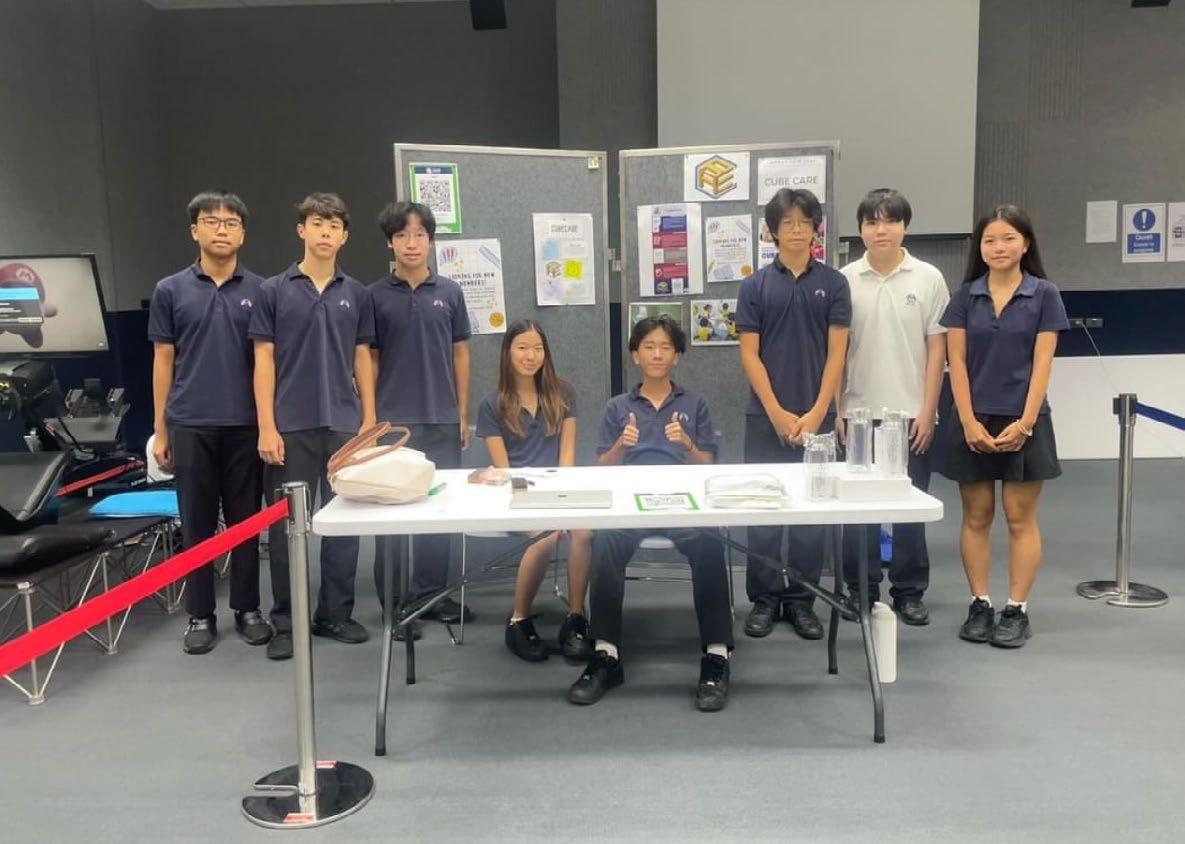
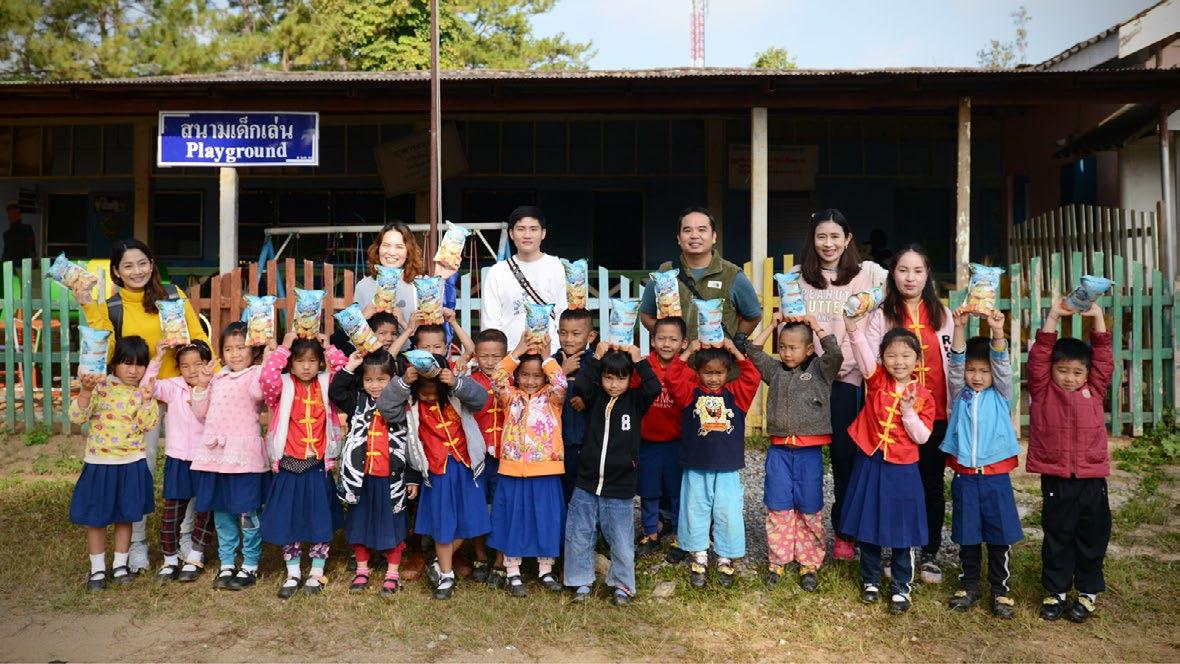
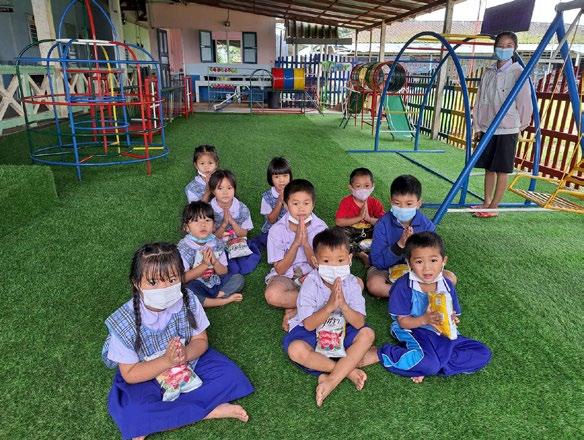




As part of an insightful interview with Sherry Turkle, author of ‘Reclaiming Conversation’, she discusses the impact of digital devices on relational connections within families. Turkle expresses concern that phones often distract us from meaningful family connections.
Have a great weekend.
Brian Taylor Assistant Principal, Technologyfor Learning


DATE Saturday 28th September 2024
TIME 9:00am-1pm (time-slots – 9-10am, 1011am, 11am-12pm, 12pm-1pm)
SIGN UP Registrations open Monday 26th August
INFO solofestival@patana.ac.th


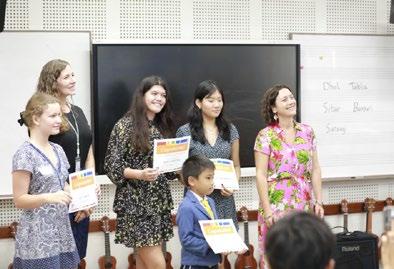
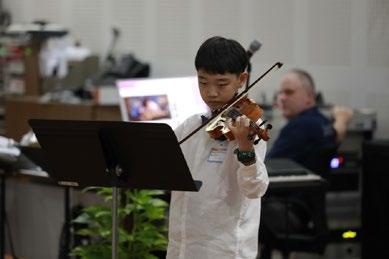
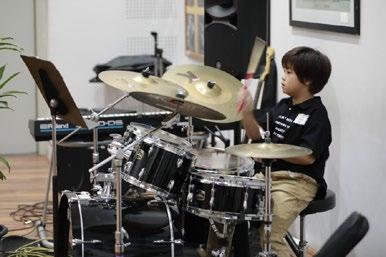

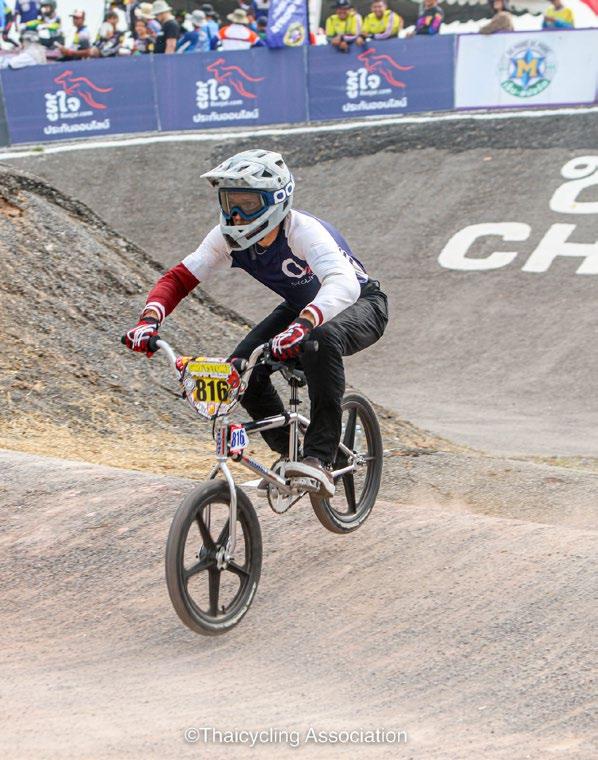
Iplayedone game for my school football team. After missing an open goal I was never asked back and I never lived it down. As a sprinter, I was forced to be a ‘winger’ (whatever that was) for the school rugby team. After chasing down, and deliberately tripping, an opponent (I saw no sense in throwing myself at his feet) my rugby career also ended the day it started. I was actually banned from playing for my ‘creative’ tackle. My sport began when I got home. Swapping school shoes for Vans, I’d head straight out on my BMX, calling for friends enroute to the field where we’d built jumps. Sundays were for racing, at tracks all over the UK.
Until recently, I’d never really thought about why didn’t try to get better at team sports, to muscle my way into them. After all, they teach a spectrum of life skills and foster camaraderie and lifelong friendships. But they’re not for everyone and I’ve recently discovered why this is. Students who study Sports Exercise Science at Patana learn of the different categories of sports participation, these being individual, coactive and interactive. Recreational BMX, skateboarding, wakeboarding and the like, belong in the first category. Hanging out at the jumps, skate or wake-park fosters deep bonds of friendship like with team sports. There are celebratory cheers and whoops that ring out when a trick is finally landed, and the adulation is for

the individual. It’s recognition, by peers, of the endeavour invested. When, broken and bloodied after it’s all gone wrong, there’s sympathy and a helping hand, not blame. After all, whose fault was it?
For some, the competitive spirit can’t be ignored and each of these sports has their competitive wing. In BMX for example, eight riders compete on the track, making it a coactive sport. Fiercely competitive, it’s up to the individual to pedal and strategize during 40 furious seconds. Accountable to nobody but the voice of the internal monologue (that can scream as loudly as the harshest of coaches) a rider takes full responsibility for the result. It’s on them. Research is now being conducted into the relationship between neurodiversity and the sporting pursuits we choose. In short, the complexity of sporting rules and the often hard to navigate social dynamics within teams make the prospect of teams sports unattractive for many.
In this podcast, the former head coach of the Thai BMX programme, Dr Adam Carey (he is literally a Doctor of BMX!) explains why for some, team sports aren’t a good fit and why BMX and other coactive sports might offer a brilliant alternative.
https://youtu.be/ZnMDcFsfq1E?list=PLCpmxKkPiU-TCK1Z1C_EsJmwb2LuQALGn&t=997
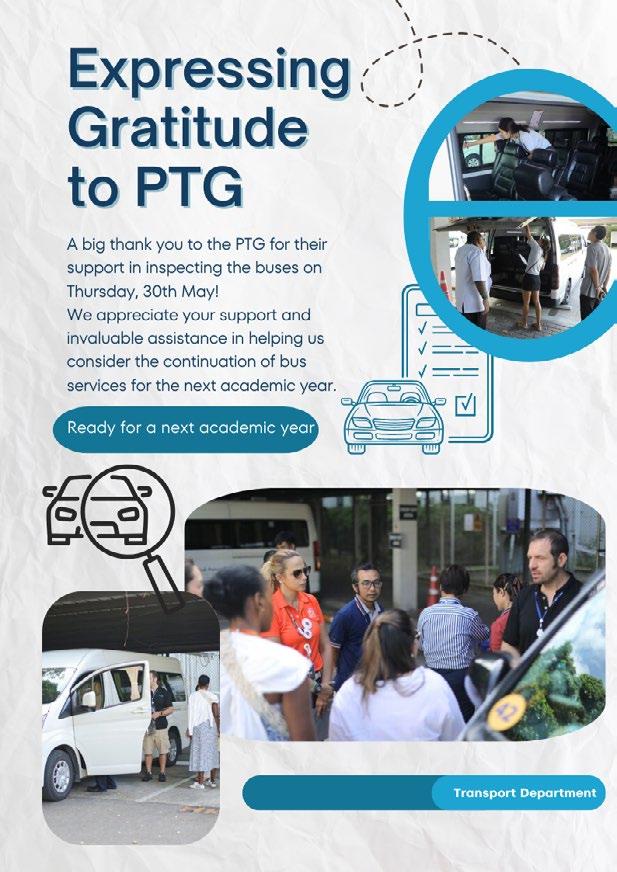
Dear Patana Families,
We are writing to you with a concern for the safety and well-being of everyone in our school community. Please adhere to the following rule: when exiting Soi 39 or 39/1, turning right is strictly prohibited as it violates traffic regulations. This action poses a significant risk of accidents, which we are determined to prevent. We urge you to exercise patience and empathy while driving within and around the school premises and to be considerate when utilizing parking facilities. By following these guidelines, we can ensure a safer environment for all our students, staff, and families.




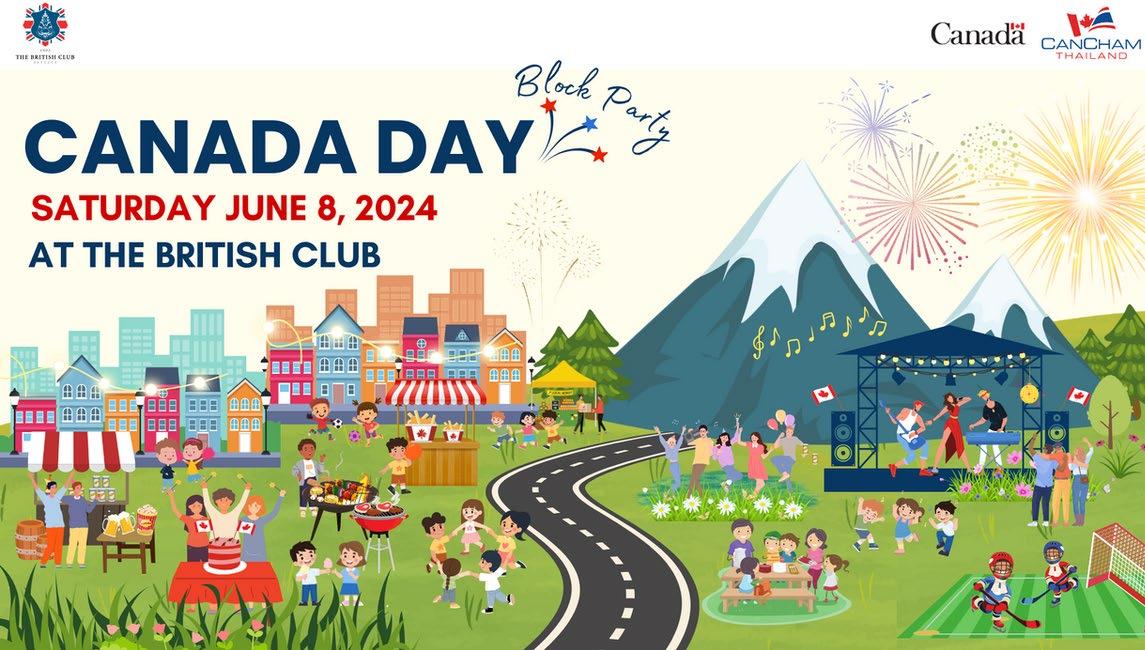
Saturday, June 8, 12:00 noon – 11:00 pm at The British Club (Silom 18)
189 Silom 18, Suriya Wong, Bang Rak, Bangkok 10500
Buy your tickets and let the good times roll
CanCham Thailand’s largest and most anticipated event of the year, Canada Day / Fête du Canada, is just around the corner!
Come join us to celebrate Canada’s birthday.








